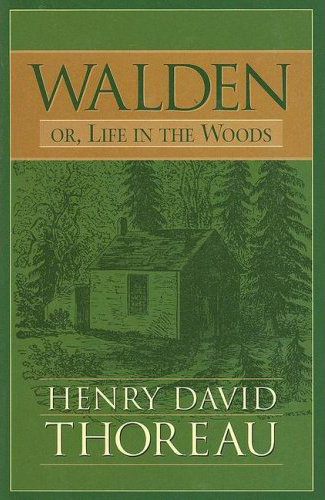The young United States of America was treated to two major publications in 1854 and 1855. The latter was Walt Whitman’s Leaves of Grass, the former Henry David Thoreau’s Walden, both books pioneering efforts, attempts to reconcile the raw individual ego with the pristine lands and burgeoning communities it had to survive in.
Thoreau chose to create a sort of extended, reflective philosophical treatise based on his two years and two months living in the woods, an act designed to provoke others into questioning their own existence and mode of being. Call him a loner, a societal misfit; the fact that he chose to build his own wood cabin and farm a bit of land for food means he did practice what he preached, albeit for a short period of time.
“I went to the woods because I wished to live deliberately, to front only the essential facts of life, and see if I could not learn what it had to teach, and not, when I came to die, discover that I had not lived.”
A former teacher, he had gone to live on the land, owned by friend and mentor Ralph Waldo Emerson, because he wanted t experience things “mean” and “sublime”; he didn’t want a life “frayed by detail.”
Whether you see Thoreau as a visionary transcendentalist or self-righteous squatter with nothing better to do than eat plates of purslane and watch Nature whilst the rest of mankind gets on with the business of the day, there are some thought-provoking ideas shining out from the dense prose.
Who can argue against the cry of “Simplify! Simplify” in today’s vastly overloaded consumerist society? Thoreau was ahead of his time in suggesting that not all human progress is to be measured by quantity. He thought some modern advancements an “illusion.”
This paper shows the book is not for the faint-hearted; it takes some reading, especially those chapters that deal with the cost of a nail, and the profit-and-loss account of a tiny farm. There are demanding passages relating to Thoreau’s previous philosophical and poetical influences, and not all of them, are totally convincing. His is often a romantic, contradictory ideal.
For example he writes: “If a man built his own house, like a bird a nest, would a man not sing poetically?”, declaring a few pages later that he wouldn’t want anyone to adopt his mode of living.
And he comes over as quite the inverse snob when he refuses the gift of a mat for his cabin from a local woman, declaring, “It is best to avoid the beginnings of evil.” He seems to have something against the local villagers and townspeople of Concord, suggesting that they are nothing more than illiterate brutes with no sensitivity toward nature and no interest in true self-improvement.
In short, Thoreau’s book does contain profound insights and compelling ideas, but it is a hotchpotch at times. Nature lovers will thrill to the descriptions of birds and insects, hares, owls, foxes and mice and so on; ecologically minded folks will love his take on sustainability.
Skeptics might question his motives, especially when he lived no more than a walk away from the comforts of a friend’s house for laundry, had no family or business commitments, and seemed to want poverty for all. Walden is not a straightforward book. In it are the ramblings of a God-fearing prophet who sought an exclusive higher life (he claimed that generative energy made humans unclean, for example) purified by the truth of fire!
“Man flows at once to God when the channel of purity is open.”
What the book does best is to question the individual’s role and authenticity within society. For that reason alone, it is still relevant and worth a long, steady read. Grow into it, grow out of it, become bored, become inspired.
